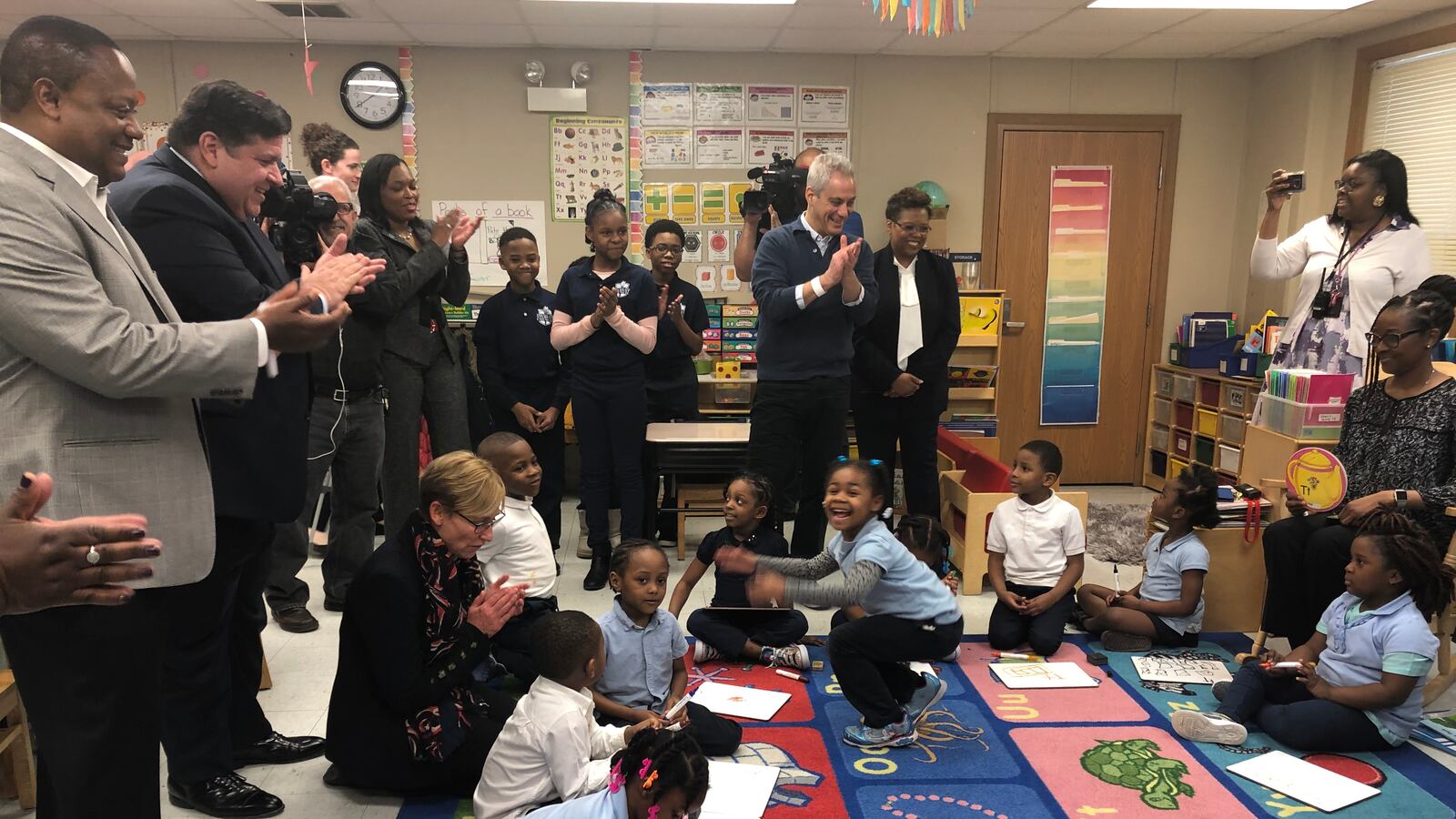Despite a “significant” state structural budget deficit, Illinois and Chicago will continue investing in early childhood education, leaders made clear on Friday.
In line with his vision of expanding early education, Mayor Rahm Emanuel said Chicago will add more than 100 pre-kindergarten classrooms in 28 communities next school year, an initiative that will cost $27 million. The city also will steer $50 million to community preschool and day care providers to help them expand their clientele to infants, toddlers and 3-year-olds.
And statewide, Gov. J.B. Pritzker said for the first time that he expects that universal preschool for 4-year-olds would become a reality within four years.
Speaking to reporters Friday, Pritzker said investments in early childhood would start with an additional $100 million in his first budget cycle.
“If you really want to save money in a state budget, [early childhood education] is actually one of the best places you put your money.”
The governor appeared with Emanuel and schools chief Janice Jackson Friday at John T. Pirie Fine Arts and Academic Center.
Emanuel was rolling out the second year of his preschool initiative: Most of the new classrooms will be in Chicago’s South and West sides, with one on the North side. The $27 million investment he announced includes mostly state funds, and the $50 million for community care — intended to address providers’ concerns about losing children to city-run centers — draws from federal Head Start, state and a small amount of local funds.
Friday’s city announcement confirms a preschool expansion Chalkbeat previously had reported.
Next fall, Chicago will open additional public school classrooms concentrated in two dozen low-income neighborhoods, but it will offer fewer options in the schools for 3-year-olds, whose access will be restricted to half-day programs. The move is intended to help shift some younger customers who need full-day care back to community centers.
About 21,000 3- and 4-year-olds are currently enrolled between public schools and a mix of community-run and for-profit programs.
As it announced earlier, the city will also invest $6 million in a scholarship program to help address an early childhood workforce shortage that has hit community providers particularly hard. The city said several institutions have signed on to expand coursework and credentialing options, including City Colleges, the University of Illinois at Chicago, and the Erikson Institute.
Samantha Aigner-Treworgy, the mayor’s early learning chief, said the additional money should ensure that, as Chicago Public Schools opens additional full-day classrooms for 4-year-olds, community providers also enjoy “continued growth and sustainability.”
“We are working to ensure (community providers) have funding and support,” she said.
The $50 million boost consists of federal funds tied to the Head Start program and a portion of Illinois Gov. J.B. Pritzker’s proposed $100 million early childhood spending boost, of which Chicago is guaranteed a fixed percentage by state law.
“There are so many ways of using that money to strengthen the field,” said Maricela Garcia, the CEO of Gads Hill, which operates two early childhood centers in Lawndale and Chicago Lawn and is building a third. She said she hoped some money will be set aside to help nonprofits like hers increase teacher salaries and compete with the salary schedule at the schools.
“By creating parity between community organizations and Chicago Public Schools, that’s the only way we are going to be able to compete on a more level field,” Garcia said.
Starting next month, families can apply through the online early-learning portal; there will be changes there, too. New disclosure questions will appear on the form in response to a recent report from the Office of the Inspector General for Chicago’s Board of Education that revealed an alleged $2 million preschool tuition fraud due to mismanagement of billing systems.
Only 11 schools now offer tuition-based programs.
Since Mayor Rahm Emanuel announced last May that Chicago would offer full-day universal pre-K for every 4-year-old by 2021-22, the city has been in an aggressive expansion mode. The hurried rollout has frustrated some community providers who operate on thin margins and say that the city’s plan has been clumsy, poorly communicated, and a threat to their businesses.
Both of the candidates vying to replace Emanuel as the city’s mayor, former federal prosecutor Lori Lightfoot and Cook County Board President Toni Preckwinkle, have pledged to continue on the path of universal pre-K.
The new wave of city grants is intended to help operators counter the loss and hire more staff or help existing staff obtain the necessary credentials to work with younger children. The city plans to announce a grant competition soon, and all non-school programs that take public funding will be encouraged to apply.
Chicago also is chipping in on construction of at least two early learning centers, one to be run by Gads Hill in Brighton Park and another operated by Asian Human Services out of Passages Charter School in Edgewater. Those investments — totaling $2.7 million — were announced last summer as part of the $1 billion capital plan for schools.
Garcia, the CEO of Gads Hill, stressed the need for capital funding for more centers. She also called on the city to prioritize a marketing campaign to inform families of the value of high-quality preschool and educate them on how to apply.
“If parents were better educated about the difference between child care and a child care development center,” she said, “I think they would make different decisions.”

